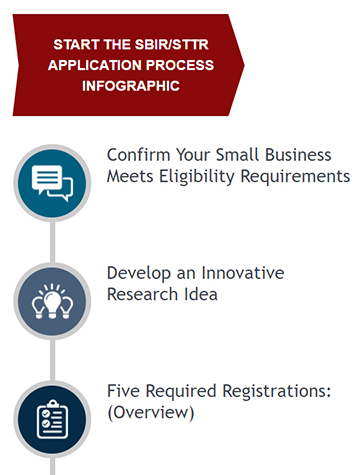





Applicants are strongly encouraged to contact program and should send program managers a brief abstract or overview of their technology at least one month before the SBIR/STTR standard deadline.
Receipt dates are now January 5, April 5, and September 5. Review eligibility criteria for SBIR/STTR awards.

Use this interactive infographic that contains helpful information to guide you through the NIH SBIR/STTR application process. Click though the chart for answers to your related questions.
You may also reference the NIH Office of Extramural Research (OER) application guide for further instructions on submitting grant applications to NIH.
SBIR/STTR programs are divided into three phases. The NINR will accept several application types including Phase I, Phase II, Direct-to-Phase II (SBIR only), and Phase I/Phase II "Fast-Track" applications which are reviewed together. Phase III, where appropriate, is for the small business to pursue commercialization objectives resulting from the Phase I/II R/R&D activities. Both appropriateness of application type for your planned efforts and the responsiveness of your proposed project to the funding opportunity should go into your selection of a FOA.
The NIH SBIR/STTR programs do not fund Phase III and NIH does not generally provide any Phase III funding to small businesses. However, a cornerstone of the SBIR and STTR programs is helping companies move along the path of commercialization, with an emphasis on reducing technology risk and increasing the value proposition. Accordingly, NIH does offer several Technical Assistance Programs aimed at facilitating the transition to Phase III.
Most of the applications for SBIR/STTR grants are investigator-initiated and are submitted in response to the Omnibus/Parent SBIR & STTR Funding Opportunity Announcements (FOAs). For more information on how to choose which FOA to apply to, use the SBIR/STTR Clinical Trials Funding Opportunity Decision Tree.
One of the goals of the SBIR and STTR programs is to encourage participation in innovation and entrepreneurship by socially and economically disadvantaged small businesses (SDB) and women-owned small businesses (WOSB). Learn more.
Both SBIR & STTR awards are grants. One of the benefits of the federal grants is that grants don't dilute ownership or equity and don't require repayment or payment of royalties. Intellectual property developed with the funds is retained by the company.
Small businesses are eligible to apply for non-SBIR/STTR type grants. See here for additional NINR funding opportunities.